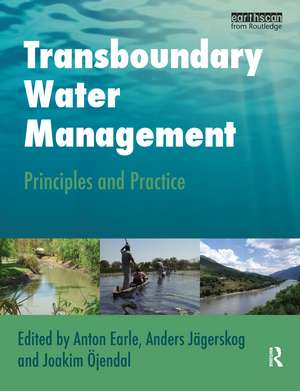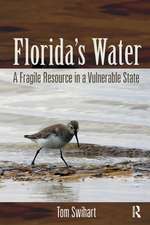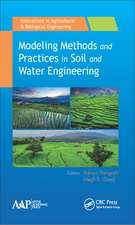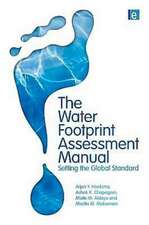Transboundary Water Management: Principles and Practice
Editat de Anton Earle, Anders Jägerskog, Joakim Öjendalen Limba Engleză Paperback – 25 aug 2010
Preț: 325.58 lei
Preț vechi: 417.73 lei
-22% Nou
Puncte Express: 488
Preț estimativ în valută:
62.31€ • 64.81$ • 51.44£
62.31€ • 64.81$ • 51.44£
Carte tipărită la comandă
Livrare economică 14-28 aprilie
Preluare comenzi: 021 569.72.76
Specificații
ISBN-13: 9781849711388
ISBN-10: 1849711380
Pagini: 280
Ilustrații: Maps, diagrams, tables, graphs, index
Dimensiuni: 189 x 246 x 20 mm
Greutate: 0.53 kg
Ediția:1
Editura: Taylor & Francis
Colecția Routledge
Locul publicării:Oxford, United Kingdom
ISBN-10: 1849711380
Pagini: 280
Ilustrații: Maps, diagrams, tables, graphs, index
Dimensiuni: 189 x 246 x 20 mm
Greutate: 0.53 kg
Ediția:1
Editura: Taylor & Francis
Colecția Routledge
Locul publicării:Oxford, United Kingdom
Public țintă
Academic and Professional Practice & DevelopmentCuprins
ForewordContributors1. Introduction: Setting the Scene for Transboundary Water Management ApproachesPart I: Analytical Approaches to Transboundary Water Management2. Why Negotiate? Asymmetric endowments and asymmetric power and the invisible nexus of water, trade and power that brings apparent water security3. Power, Hegemony and Critical Hydropolitics4. Getting Beyond the Environment-Conflict Trap: Benefit-Sharing in International River BasinsPart II: Transboundary Water Management Polity and Practice5. International Water Law: concepts, evolution and development6. Aquifer Resources in a Transboundary Context: A Hidden Resource? - Enabling the Practitioner To 'See It & Bank It' for Good Use7. Governance in Transboundary Basins - the Role of Stakeholders, Concepts and Approaches in International River Basins8. Environmental Flows in Shared Watercourses: Review of Assessment Methods and Relevance in the Transboundary Setting9. Managing Water Negotiations and Conflicts in Concept and in Practice10. Identifying Business Models for Transboundary River Basin InstitutionsPart III: Challenges and Opportunities11. Sustainability of Transnational Water Agreements in the Face of Socio-Economic and Environmental Change12. Enhanced Knowledge and Education Systems for Strengthening the Capacity of Transboundary Water Management13. Case studies of TWM Initiatives: 13 initiatives from various parts of the world14. Towards a Conceptual Framework for Transboundary Water ManagementIndex
Notă biografică
Anton Earle is Project Director of Capacity Building, at the Stockholm International Water Institute (SIWI), Sweden
Anders Jägerskog is Project Director, Applied Research, SIWI, and Associate Professor, School of Global Studies, Peace and Development Research, University of Gothenburg, Sweden
Joakim Öjendal is Professor at the School of Global Studies, Peace and Development Research, University of Gothenburg, Sweden.
Anders Jägerskog is Project Director, Applied Research, SIWI, and Associate Professor, School of Global Studies, Peace and Development Research, University of Gothenburg, Sweden
Joakim Öjendal is Professor at the School of Global Studies, Peace and Development Research, University of Gothenburg, Sweden.
Recenzii
'It is essential that the international community support (these) efforts by strengthening all facets of institutional capacity for effective water management. This volume represents a tangible contribution to this effort by placing the current knowledge and experience of water management professionals and researchers within reach of a broad audience.' – From the Foreword by Irina Bokova, Director-General of UNESCO
'This remarkable book provides an essential overview of the topic for researchers and water resource managers. At the same time, as water rises higher on the political agenda in many regions of the world, and more and more people's lives are affected in various ways -either by too much or too little water - this book will provide vital insights for politicians and government negotiators concerned with issues of water security.' – Ania Grobicki, Executive Secretary, Global Water Partnership, Sweden
'It is stimulating to find a book that considers transboundary waters as a challenge that can be dealt with to the benefit of the different riparians through negotiations, cooperation and institutional capacity, rather than stressing the irrelevant argument of water wars.' – Cecilia Tortajada, Vice President, Third World Centre for Water Management, Mexico
'This book is the first to bring together in a concise and accessible way all of the main topics to be considered when managing transboundary waters' – BASE
'Transboundary Water Management is a well-researched book that not only provides the theoretical basis of managing water across boundaries but enlists approaches that have indeed worked too. As water rises higher on the political agenda, with lives of more and more people being either affected by too much or too little water, the book should provide a conceptual framework for planners and politicians to negotiate their compelling concerns. It is a book of hope that considers transboundary waters a challenge that can be dealt with.' – Sudhirendar Sharma, d-sector.org
'This remarkable book provides an essential overview of the topic for researchers and water resource managers. At the same time, as water rises higher on the political agenda in many regions of the world, and more and more people's lives are affected in various ways -either by too much or too little water - this book will provide vital insights for politicians and government negotiators concerned with issues of water security.' – Ania Grobicki, Executive Secretary, Global Water Partnership, Sweden
'It is stimulating to find a book that considers transboundary waters as a challenge that can be dealt with to the benefit of the different riparians through negotiations, cooperation and institutional capacity, rather than stressing the irrelevant argument of water wars.' – Cecilia Tortajada, Vice President, Third World Centre for Water Management, Mexico
'This book is the first to bring together in a concise and accessible way all of the main topics to be considered when managing transboundary waters' – BASE
'Transboundary Water Management is a well-researched book that not only provides the theoretical basis of managing water across boundaries but enlists approaches that have indeed worked too. As water rises higher on the political agenda, with lives of more and more people being either affected by too much or too little water, the book should provide a conceptual framework for planners and politicians to negotiate their compelling concerns. It is a book of hope that considers transboundary waters a challenge that can be dealt with.' – Sudhirendar Sharma, d-sector.org












